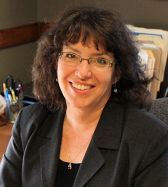Divita brings experience to community development

Community Development Director
October 7, 2014
Ellen Divita plans to bring her experience from other towns she’s worked in to her new position as Community Development director.
When getting her master’s in urban planning at the University of Illinois, Divita did work for Urbana; since then, she has worked in Geneva, Oswego and Woodstock, among other areas. Divita said DeKalb appeals to her because of NIU’s engineering program and the potential the university offers for the future of the community.
Divita will begin her position Nov. 20.
Northern Star: What exactly is your job going to be?
Ellen Divita: I will be the city’s next Community Development director. And it’s a position that, according to my understanding, is being recreated. In about 2009 when the city was going through a lot of changes, all the functions of the department were in other places, so the department is being recreated. … The Community Development Department will be recreated, and it will oversee planning, short-term and long-term planning and … [the] community development block grant program and economic development. Crime-free housing isn’t policed right now, but the building permit and review process and the property maintenance code will be under this department, as well … .
NS: What would you say you are able to bring to DeKalb?
ED: Well, I have a pretty good track record in the communities I’ve worked in. The communities I’ve been in have had a variety of results and it depends on the community because every community is going to have a different set of goals ahead of them based on where they are.
In Geneva I was doing more retail development; in Woodstock I was doing more industrial development. It depends on each town where they are in their own strategic planning processing, so one of the first things I’ll be doing is getting fully acquainted with the city itself and the goals, and a lot of that is expressed in the adopted plans, long-range planning documents and the city’s comprehensive plan, but you’re asking what is it that I bring.
I approach my job in that it is my role to hear what the community wants and to get the right people together at the table to find ways to get there, and I’m a community developer, and it’s ‘Where does the community want to go and how do they want to work together to get there?’ … .
NS: You mentioned having a good track record. Is there anything you are particularly proud of from your previous employment?
ED: I think I’ve made an impact in every town I’ve been in. … When I was hired in Woodstock, the situational analysis, the folks putting the economic program together thought that the No. 1 problem was that they should replace industrial jobs that were lost.
And when I came there and did my situational analysis, and working with community leaders, economic development board and the chamber board, we were able to recognize the sales tax had been decreasing significantly in the city because once the jobs were lost, people had left town eventually, and the new folks that moved in were still working in other communities, and they were shopping on their way home. …
The city’s population had grown 25 percent and 10 years prior, the sales tax had decreased significantly, and that was a huge chunk of the city’s operating budget. So, the work plan there wasn’t just to recreate industrial jobs, it was also to recruit some new retailers.
But then that opened up an whole other set of situations because there weren’t any sites in town that were large enough for new a grocery store that had capacity for the sewer and water, so it turned into a project of how are we going to get new utility lines around these other potential locations. … .
NS: Why did you decide to come to DeKalb? Do you have any connections with the city?
ED: I did not go to school there; my brother went to school there. … Advanced manufacturing is, I think, very important for the future of the country as a whole, and technology-led manufacturing is going to be key. The university has such a strong engineering program; I’m interested in learning more about what that will mean for the city for entrepreneurial business start-up. And just the resources of the university as a whole I think are integral to the city’s future development.
NS: What would you do to benefit the students at NIU?
ED: I think the first thing I need to know is, what kind of benefits do people want? I have been involved with the internship program through the Center for Governmental Studies for years and I’ve been fortunate to always have an intern from NIU working for me, and it’s a real positive.
So, what I do, since what you’ve got is cutting-edge research, and access to the professors, and what’s new, and the internship programs that the university has are wonderful.
… I’ll be looking at statistics, gross statistics, building permits, specific sales tax, and where does it grow and where it is contracting, and where there’s opportunity. And a lot of that is always anecdotal, so I’ll be interested in what folks have to say and talking to people.






